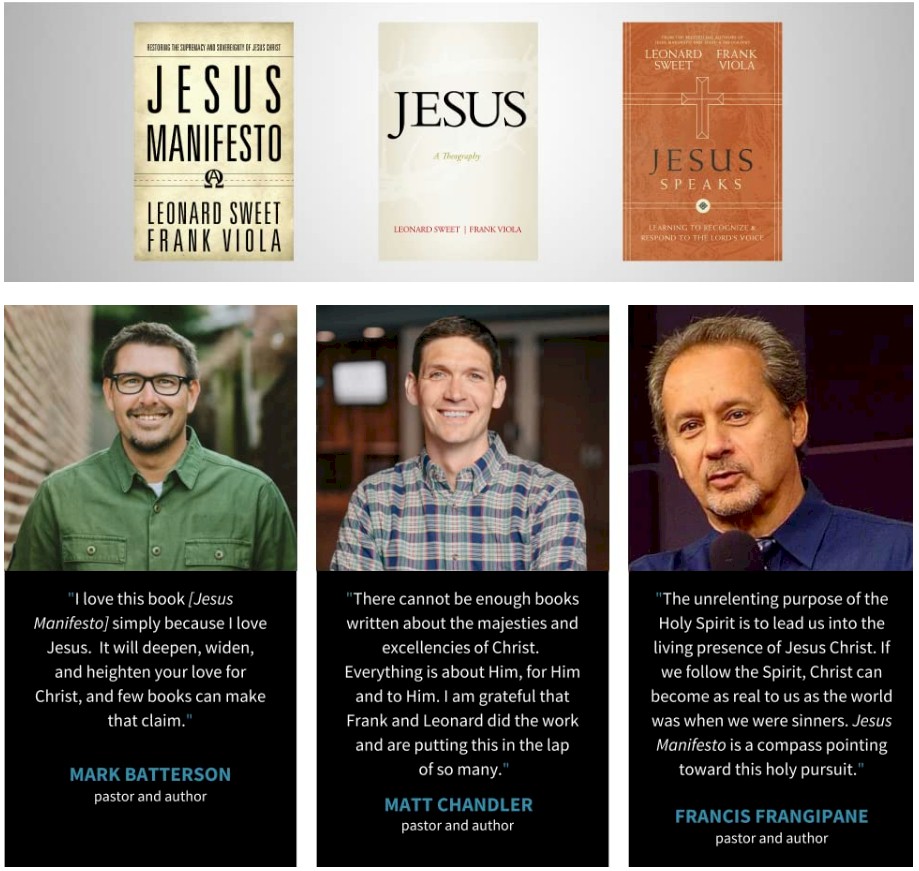Frank Viola and Leonard Sweet teamed up to write three books together on Jesus. You can find them all on the Jesus Trilogy page. What follows is an interview that Viola did with Sweet on one of his solo books. The interview is followed by numerous interviews (audio and print) with both authors.

My friend Len Sweet has written a book called The Well-Played Life. Here are my questions and his answers.

Tell us a bit about the experiences that shaped the insights in the book.
Leonard Sweet: I was devastated a few years back when some of my friends in ministry, who lived to work for the church and pushed themselves relentlessly, died young of exhaustion and early aging.
This is not the way God intended us to be in relationship with Jesus, and not the way he intended for us to live our lives. All through the scriptures, we read, that we are to “delight in the Lord,” to be “joyful” servants, to feast, sing, and dance to the Lord our God, to enter the kingdom as a “child.” I realized in my own life, as I’ve seen also in many others, that I have been shaped more by the Protestant Work Ethic than by God’s dictate to be joyful in His saving grace.
We were designed to play from the moment we were created in God’s garden. And Jesus, the second Adam, came to save us from work and bring us back into that loving and healing relationship. It’s time we all embraced the truth of the gospel that tells us our grace is a free gift to celebrate. It’s time we stopped running ourselves into the ground trying to “achieve” God’s favor. This book is as much a testimony to my own life, as it is a statement about the perils of our work-ourselves-to-the-bone culture.
Explain the title for us.
Leonard Sweet: If I would have titled the book, I would have called it “You don’t work a violin.” The Well-Played Life is about living in the loving, creative, joyful grace of God through every phase of life and discipleship. Through childhood, middle adulthood, and what I am calling the “third age,” our relationship with God changes due to the things we are experiencing in that stage of life. But we need to learn how to “play” through every phase.
The Well Played Life means that our lives no matter where and when must be a testament to the glory of God, and the fruit of that relationship will be shown in how well we “play” in our relationship with God. Think of the Church as a bride and Jesus as the groom. If your marriage is all work, you won’t get very far. The more we play in our relationship with the Creator, the more we will live in His image.
Give us two or three insights from the book that would be helpful to all Christians.
Leonard Sweet: 1) There is no creation without play. Play is oxygen for the imagination, which sparks creativity, which ignites innovation, which combusts in paradigm shifts. The churches that are most alive are the ones that allow the Holy Spirit to move creatively and to infuse movement and change and creative imagination into the lives of disciples.
2) Jesus said, “Come unto me, all ye who are heavy laden, and I will give you rest.” In the church, we say, “come to us, all you who are heavy laden, and we will give you –more work.” The church needs to return to the origin-al discovery of Protestantism –that salvation is a free gift meant to free us from the toil of the world. We need to shed the ethic of work and instate an ethic of play.
3) The church works its busiest members the most –those who are engaged in raising children, developing careers, building marriages and homes. The church’s greatest resources are in our children –our first agers– and in our “third agers.” Our children need to remind our second agers how to play, and our second agers need to allow our third agers to be the world-changers they were designed to be. Jesus was a third ager in his time when he changed the world. What are you doing to change yours?
What made you decide to write a book on play?
Leonard Sweet: The more I read Genesis, the more I am convinced, we were made to lead a life of play, joy, feasting, and dancing, in worship to the Lord. God never meant us to look dour and stiff in our worship. He meant us to worship in true spirit and joy, to show our delight in our Savior.
The more I read the relationality of the psalms, the stories of Jesus teaching us how to live life anchored to God, the more I understand how much Jesus was right in his desire to celebrate, feast, live a relational life full of praise and love.
Jesus came to show us how to be the kind of humans God created us to be. We are coming up on the 500th Anniversary of Protestantism. I decided, this is the time, more than any, to put to bed the Protestant work ethic, and to re-awaken ourselves to a new “play” ethic in our lives and in the church. It’s time to take a closer look at our theology of salvation. It’s time for the church to re-discover how to live “in God’s pleasure.”
What do you hope readers will walk away with after they finish the book?
Leonard Sweet: We have for too long envisioned our churches as “sanctuaries” that keep us safe from the world. I hope people will realize that our churches are safe places to take great risks for a gospel that sends us into the world shouting and singing about the love of Christ.
I hope people realize that living a well-played life means letting go of habits of attainment, success, and work, and instead opening ourselves up to the creative possibilities of living life in tune with God, in the joy of each day.
The church should be leading our culture in innovation and creativity. Instead we have become boring and tired. I hope readers will take this book to heart and learn to play in their faith, to worship with fervor and passion, to be the kind of Christians that make people say, “I want some of that!”
What have the responses to the book been so far . . . both positive and challenging?
Leonard Sweet: I think this book has challenged a lot of people to think differently about life, and about what God expects from them as disciples. Some for whom the work ethic has been deeply ingrained have struggled with letting go of that feeling of guilt when thinking about faith as fun-filled and joyful.
Others have welcomed the book as a relief and a blessing that allows them to feel freed to revel in the experience and the joy of their relationship with Jesus. I think for many of us, major life changes like this are hard. I hope this book makes them just a little bit easier. Playfulness is a sure and true sign that one takes his or her calling seriously.
INTERVIEWS WITH LEONARD SWEET AND FRANK VIOLA
Audio Interviews
Steve Brown Interviews Leonard Sweet & Frank Viola
Steve Brown Interviews Leonard Sweet & Frank Viola Again
Northwestern Media Interviews Frank on JESUS MANIFESTO
Interview with Christian Books (CBD) on JESUS MANIFESTO
Print Interviews
Ed Stetzer Interviews Len Sweet and Frank Viola
Mike Morrell Interviews Len Sweet and Frank Viola
Kenny Jahng Interviews Len Sweet and Frank Viola
Interview with The Christian Post on JESUS MANIFESTO
Interview with Ben Witherington on JESUS MANIFESTO
Interview with Kelly Deppen on JESUS MANIFESTO

Related Resources for JESUS MANIFESTO
10 Reasons Why Len Sweet and Frank Wrote JESUS MANIFESTO
Why JESUS MANIFESTO is Not a Recipe Book
The Writing of JESUS MANIFESTO
Reader Reactions to JESUS MANIFESTO
Rethinking Discipleship (conference message by Frank)
Resources Related for JESUS: A THEOGRAPHY
Listen to the Introduction (Audio)
Read the Appendix (Post-Apostolic Witnesses)
Rick Warren Features the Book Twice
Frank Shares the Untold Story Behind Writing Jesus: A Theography (Audio)
Frank Discusses Jesus and the Scriptures (Audio)
Christian Books Interviews Frank on Jesus, Biblical Interpretation, and the Gospel (Audio)
What Happened Before the Foundation of the World? (Print Excerpt)
Remembering the Perfume (Print Excerpt)
Related Resources for JESUS SPEAKS
